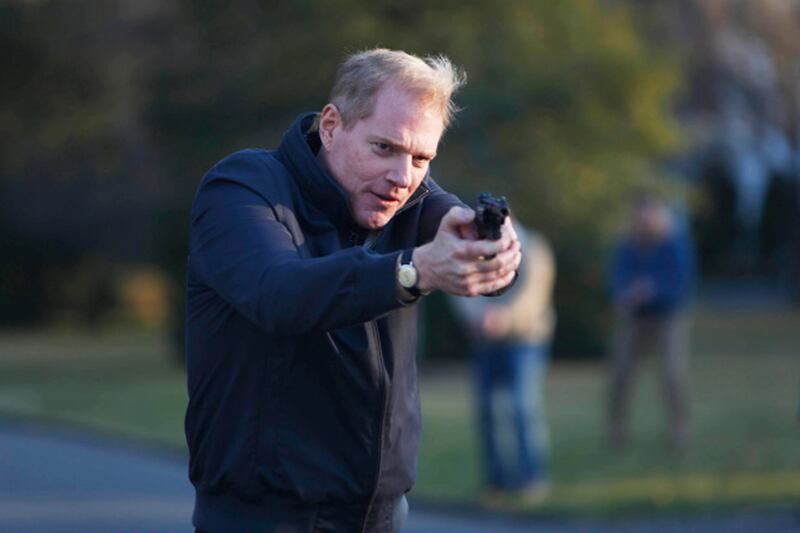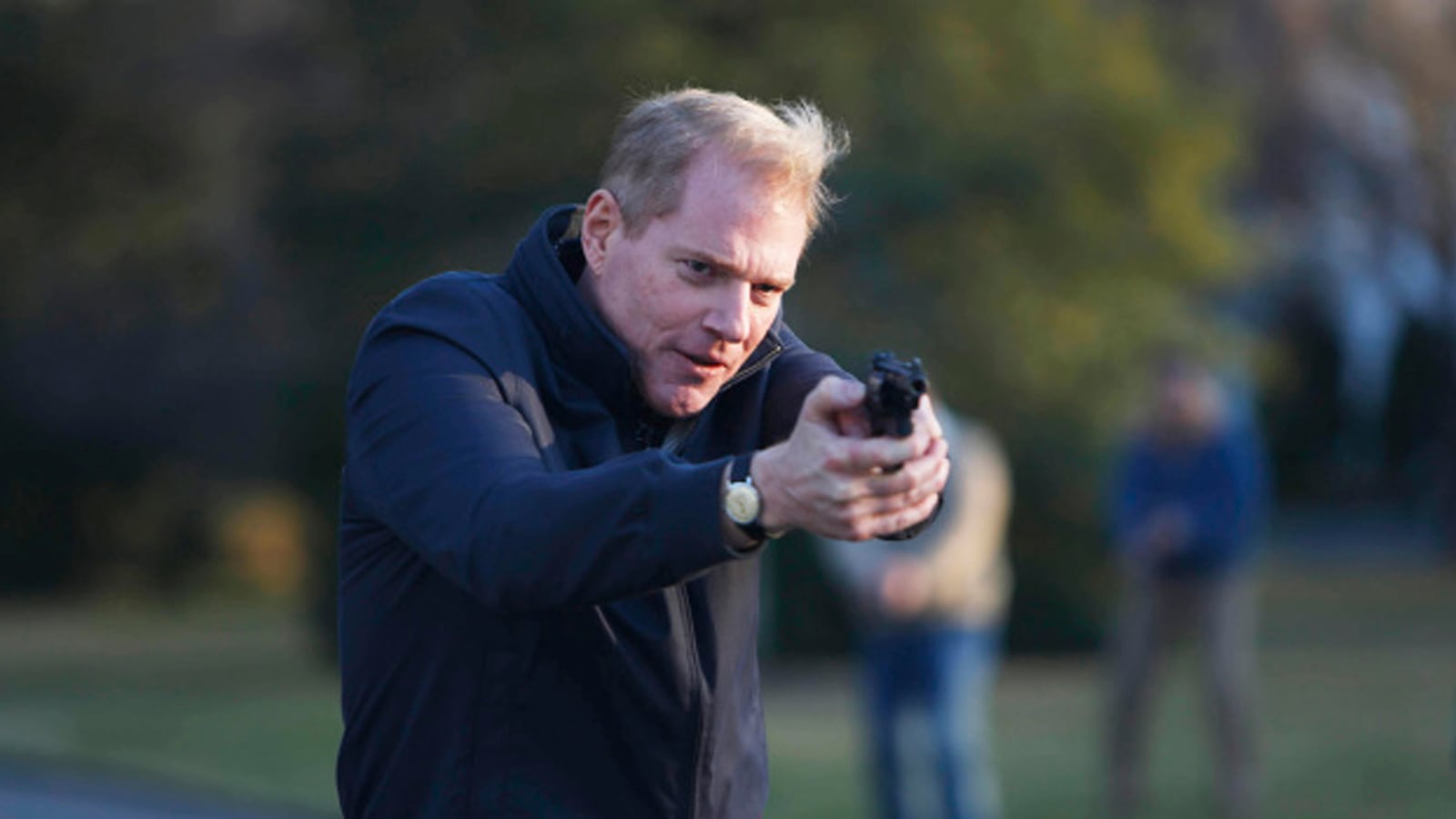For two decades, Noah Emmerich toiled in dozens of “that guy” movie roles, wondering what it would be like to have his turn in the spotlight. After finally breaking out this year as Stan Beeman, the muted, tortured FBI agent slowly losing his bearings on FX’s crackling spy drama The Americans, the actor finally has his answer: it’s a lot like sleeping with Jack Nicholson.
“The thing that pops into my head is the Shirley MacLaine quote from Terms of Endearment,” said Emmerich. “She hasn’t had sex in awhile and then she has sex with Jack Nicholson and she’s like, ‘That was fan-fucking-tastic!’ And it is. It’s fan-fucking-tastic!”

It’s also a term that many fans of the FX freshman drama, which airs its season finale tonight, would use to describe Emmerich’s understated, mesmerizing performance as Stan, an FBI agent readjusting to the real world but still haunted by his multiyear deep-undercover assignment with a white supremacist group. As he doggedly searches for KGB spies on American soil—not realizing they are literally hiding in plain sight on his suburban block as Elizabeth and Philip Jennings (Keri Russell and Matthew Rhys)—Stan has already lost his FBI partner and is coming close to losing his marriage.
“Stan was initially conceived as a somewhat lighter character,” Joe Weisberg, the creator of The Americans, told The Daily Beast. “As the story developed, he became more complex and richer. And then Noah started doing the incredible things that really only Noah can do.”
Stan is the first series regular role for Emmerich, 48, who has spent 20 years turning out solid supporting performances in films like Beautiful Girls, The Truman Show, and Little Children, usually playing a cop, best friend, or both. “He’s one of those people that, when you realize who he is, you go, ‘Oh yeah, I love that guy!’” said Scandal actor Joshua Malina, Emmerich’s former Yale roommate and close friend of 25 years. “But I knew there would eventually be that role where you go, ‘Holy shit, this guy is a great actor.’”
Which is partly why Emmerich had shifted his focus toward TV in recent years. “I kept coming back to television as being a place where bold, interesting work was being done, more I think than in the cinema which has become such a crowded, noisy, expensive marketplace,” he said. “At the same time, I found myself sitting on the bench quite a lot, waiting for the right role, and I got tired of the intermittent-ness of it. I wanted some sort of continuity and a home base.”
He’s found both in The Americans. Emmerich, however, initially bristled at playing a part that violated his one edict for any potential long-term TV role. “Going in, I thought, I don’t want be a character who carries a badge or a gun,” he said. “I felt that I had done it enough in my career and if a badge and gun were involved, it would end up being a procedural show, which holds little interest for me as an actor.” So when he read that Stan was an FBI agent, “I dismissed it, prejudicially.”
Emmerich shared his reservations with longtime friend Gavin O’Connor, who had directed him in films like 2004’s Miracle and 2011’s Warrior and who was also helming the Americans pilot. “He said, ‘I think you should give it a second look. It’s a more interesting character than that,’” Emmerich said. “So I went back and read it again, this time trying to put aside my prejudice, and I realized that he was right.”
As the season progressed, Stan’s journey became ever murkier: he began an affair with his Russian informant Nina (Annet Mahendru), as his marriage—already on tenuous ground after the years he spent undercover—nearly unraveled. The season’s ninth episode, “Safe House,” brought Stan to the foreground for the first time and propelled him down his darkest path yet. Convinced that the KGB was behind the kidnapping and murder of his partner, Chris Amador—in reality, Chris had been killed only because he nearly disrupted Philip’s long con on an FBI secretary Chris was infatuated with—Stan ruthlessly executes Vlad (Vitaly Benko), a junior KGB officer that the FBI had nabbed in retaliation.
The episode was a shocking turn of events for the closest character The Americans had to a moral center. “I don’t think Stan thinks of himself as going off the rails. To Stan, the murder of Vlad was necessary,” said Emmerich. “He had called up the Rezidentura and said, ‘If you don’t return my partner, your man is going to die.’ This man, lest we forget, is a KGB officer on America soil working to bring down America. So when Amador shows up dead, Stan has sort of boxed himself into a corner. If he doesn’t kill Vlad, then America won’t have any teeth anymore, it will lose credibility as a threat. It was a calculated decision.”
While the execution of Stan’s choice was stunning, Weisberg believes that Emmerich’s finest moment in “Safe House” occurred in the scene immediately preceding it, where Stan sits quietly in a diner waiting for a hamburger takeout order, reflecting on what is about to unfold. “I think a lot about something that Gavin [O’Connor] said, which was that Noah doesn’t act,” said Weisberg. “You watch him and he’s just present in this incredible way. He’s sitting there just waiting for his cheeseburger, but you can feel everything he’s feeling. He’s just been so powerful that way.”
That subtle, understated power comes from Emmerich’s internalized approach to acting onscreen. “There’s something magical that happens with a camera that I’ve always believed if you really are feeling something, the camera will see it, and it’s not necessary to show it,” he said.
Those skills are on display again in tonight’s season finale (“The Colonel”), which finds Stan closing in on the Russians responsible for much of the season’s mayhem while still not realizing they are his neighbors, just as Nina—who realized last week that her lover is in fact the man who killed her co-worker—has confessed her treasonous activity to her KGB superiors.
“His motivation and his desire to find these illegals has never been greater,” said Emmerich of tonight’s season finale. “He’s personally invested in a way that he hasn’t been up until now. Now it’s gotten personally integrated into his life: His marriage is falling apart. His relationship with Nina is quite troubled. He’s alone at work. He’s gone through this painful and terrible experience with Vlad. Although he did it, I don’t think it rests well with his soul. But he’s a man on a mission, a man very much alone and in pain.”
Just days after wrapping The Americans, the suddenly-in-demand actor left New York City for Santa Fe to film the Western Jane Got a Gun. “I didn’t anticipate how fun it would be to tap into that cowboy fantasy: strapping on the six-shooters and learning how to ride horses,” he said of the period Western, his first in the genre, in which he plays Natalie Portman’s husband. “I was conflicted about jumping so quickly into something because my tanks felt a little empty at the end of the long season. But this is such a different energy and environment, it’s actually been quite refreshing.”
Despite his arts background (his father owned a Manhattan art gallery and his mother is a concert pianist), an acting career was the last thing on Emmerich’s mind when he arrived at Yale University in 1983. “I had my sights set on Constitutional law,” he said. “I had eclectic interests, but I majored in history, so I did think I was going to law school.” But he also joined the Yale Spizzwinks(?), an a cappella group, where he met Joshua Malina.
During Emmerich’s junior year, Malina convinced him to try out for a production of the musical Anything Goes, where he landed a small role. “In a memorable opening-night performance, he blew one of his two lines by referring to the purser of the ship as the skipper,” recalls Malina. “He, of course, was the skipper. It was an inauspicious beginning to what is now a remarkable career. But I believe that’s where the bug was planted for him to be an actor.”
Initially, Emmerich resisted acting’s pull. “It seemed like it was crazy because it was so out of context,” he said. “I spent a year after I graduated in Asia as a travel writer, and I thought that distance would give me some perspective when I came back: if I still had this interest, I would let myself pursue it. I came back a year and a half later and I still had this desire to explore. So I did, and just kept going.”
After all the years of semi-anonymity, his Americans acclaim has taken some getting used to. Emmerich’s actor friends, including Malina and his Truman Show co-star Jim Carrey, have become his biggest cheerleaders on Twitter. “I want him to get his Emmy nomination,” said Malina. “He deserves it. Like the rest of the business, it’s all a crapshoot, but something in me feels like, this could really happen.”
A nomination “would be great,” admits Emmerich. “Being recognized and being appreciated always feels great. I think anybody who said it doesn’t is not being sincere. It’s a hard road being an actor, and those moments where people say, ‘You should be doing this!’ feel good.”
No matter what happens during awards season, Emmerich has only one plan after wrapping Jane Got a Gun: “I need to live inside my own skin for awhile,” he said. “I’m looking forward to getting grounded again. This is definitely one of the busiest years of my life.”
And after he recuperates, Emmerich said he’s ready for whatever Weisberg and his team have in store for Stan next season on The Americans. One tantalizing arc on the horizon: exploring the emotional fallout from Stan’s white supremacist assignment, frequently alluded to throughout the season as a source of great internal pain. “We’ve deliberately kept from going there in great detail this season, but, yeah, we do want to go there,” said Weisberg.
So does Emmerich, though Stan’s future is equally as compelling as his past. “The personal, the professional … there’s a lot of land to explore,” he said. “It feels like every direction holds a unique set of possibilities and challenges. It’s really exciting.”





